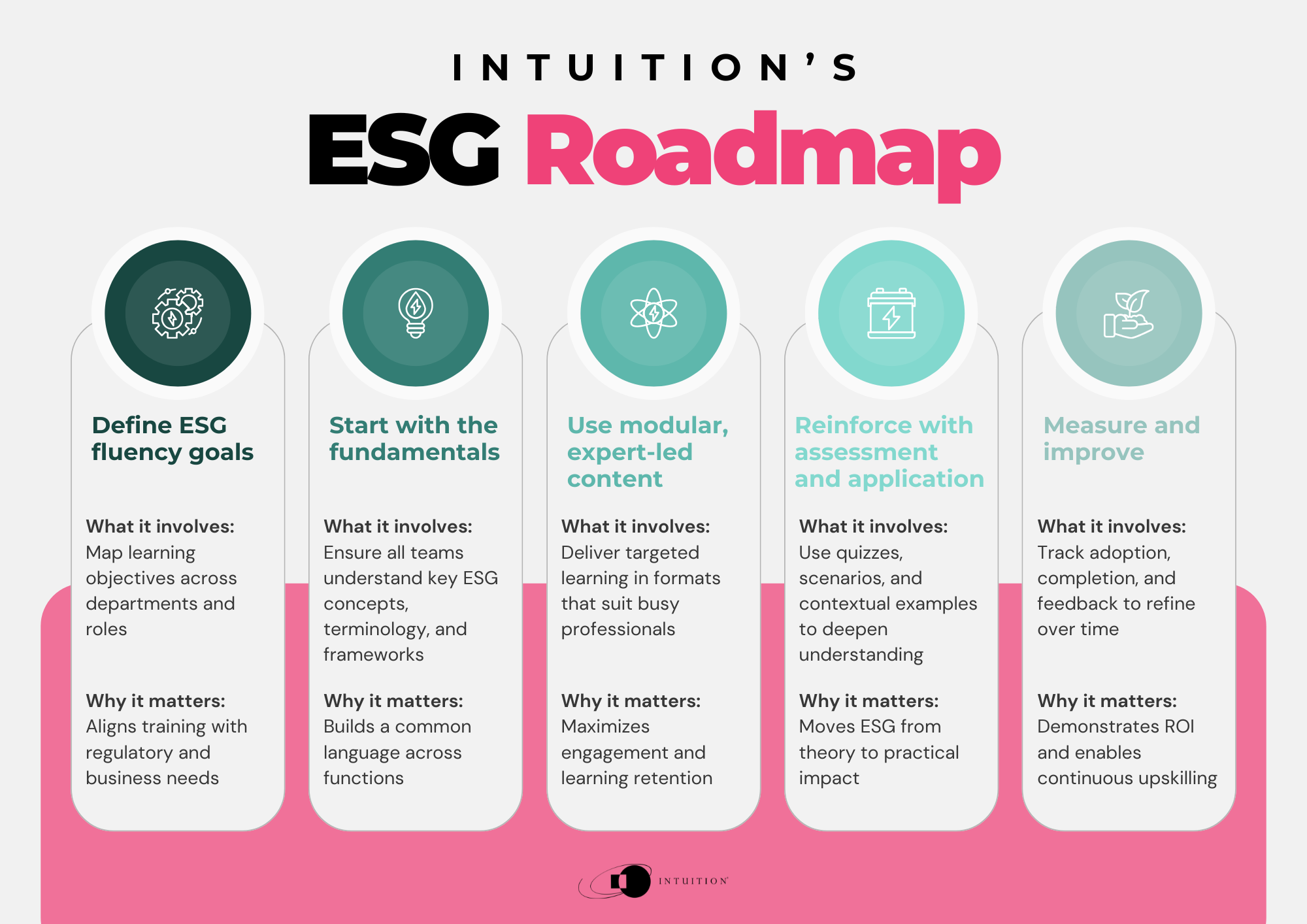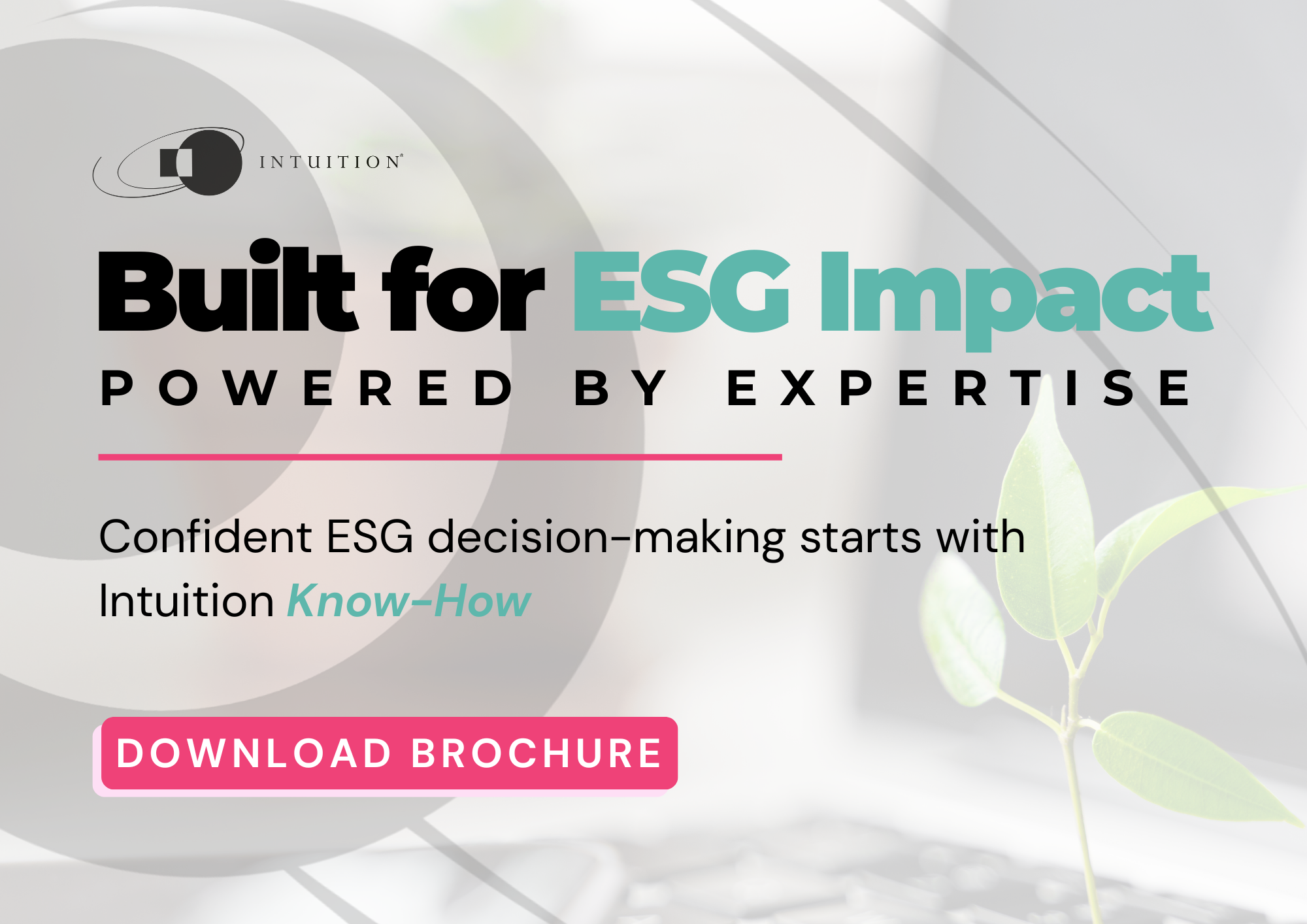As ESG expectations rise across global markets, a new challenge is emerging within organizations: internal fluency is not keeping pace.
From mandatory reporting frameworks to investor scrutiny and reputational risk, ESG has evolved from a niche concern to a core business imperative. Yet while companies are hiring ESG leads and issuing sustainability statements, many employees remain uncertain about what ESG really means in the context of their role.
Without foundational ESG knowledge embedded across teams – from relationship managers to analysts to compliance – organizations risk making misinformed decisions, missing key opportunities, or falling short of regulatory obligations.
What’s causing the ESG knowledge gap?

A rapidly expanding ESG landscape
The ESG domain is evolving quickly. From the EU Taxonomy and CSRD to frameworks like TCFD, GRI, and ISSB, professionals are expected to keep up with a growing volume of technical standards. However, these frameworks are often dense and poorly translated into day-to-day decision-making, especially in non-specialist roles.

Inconsistent internal training
While ESG messaging is often included in corporate strategy and external communications, internal enablement is lagging. Teams may receive surface-level updates, but rarely gain structured, role-relevant training that builds lasting understanding and confidence.

Unclear accountability
With ESG responsibilities spread across departments – risk, compliance, sustainability, operations – there’s often no single owner for internal ESG upskilling. This fragmentation results in inconsistent knowledge, missed linkages, and confusion about who needs to know what.
78% of executives report concern about meeting evolving ESG reporting obligations
Why it matters: risks of low fluency
Low ESG fluency isn’t just a knowledge issue – it increases exposure to multiple business risks.
Regulatory exposure:
Inadequate understanding of disclosure frameworks can lead to incomplete or non-compliant reporting.
Regulatory exposure:
Inadequate understanding of disclosure frameworks can lead to incomplete or non-compliant reporting.
Greenwashing risk:
A lack of foundational ESG knowledge can result in well-meaning but misleading claims. This has prompted regulators, including the U.S. SEC and the European Commission, to crack down on unsubstantiated ESG marketing.
Greenwashing risk:
A lack of foundational ESG knowledge can result in well-meaning but misleading claims. This has prompted regulators, including the U.S. SEC and the European Commission, to crack down on unsubstantiated ESG marketing.
74% of institutional investors would reconsider investments based on perceptions of ESG transparency or credibility
Weakened investor trust:
ESG-literate investors expect credible, data-backed reporting and governance structures.
Weakened investor trust:
ESG-literate investors expect credible, data-backed reporting and governance structures.
Missed value opportunities:
ESG is increasingly tied to long-term performance. A workforce that can't identify ESG-linked risks and opportunities is less likely to drive sustainable growth.
Missed value opportunities:
ESG is increasingly tied to long-term performance. A workforce that can't identify ESG-linked risks and opportunities is less likely to drive sustainable growth.
Building ESG fluency: a structured approach
Intuition Know-How provides a practical and scalable solution to this challenge. Our Sustainability and ESG channel offers a wide range of expert-led tutorials that help teams build foundational understanding and stay current with evolving global standards. Whether you’re training relationship managers on ESG investing or supporting compliance teams with reporting obligations, Know-How delivers content that is tailored, accessible, and built for real-world application.
Achieving meaningful ESG capability across an organization requires a deliberate and structured learning journey.
Here’s a high-level roadmap:

Why Intuition Know-How works
The Know-How platform is purpose-built for financial services teams seeking to improve ESG understanding at scale. It combines depth, structure, and flexibility in a way that works across functions and regions.
Expert-led tutorials developed by industry practitioners
Regular content updates to reflect regulatory shifts and market trends
CPD/CPE-accredited modules
Coverage of 20+ ESG topics including climate risk, sustainable finance, ESG investing, and more
Fully SCORM-compliant and LMS-ready
Expert-led tutorials developed by industry practitioners
Regular content updates to reflect regulatory shifts and market trends
CPD/CPE-accredited modules
Coverage of 20+ ESG topics including climate risk, sustainable finance, ESG investing, and more
Fully SCORM-compliant and LMS-ready
Who is this for?
The ESG channel is designed to support professionals at every stage of ESG engagement. No matter the function, the goal is the same: improve clarity, consistency, and fluency across the organization. Hover over each icon to read more.
Preview of what you’ll learn
Know-How‘s Sustainability and ESG channel features a wide range of tutorials designed to give professionals a clear, practical understanding of key ESG themes. Here’s a sample of what’s included:
Introduction to Sustainability & ESG
Understand the building blocks of ESG, including core principles, terminology, and the evolving regulatory landscape.
ESG Investing
Learn how ESG factors are integrated into investment decision-making and portfolio strategies.
Sustainable Finance
Examine how capital markets are adapting to promote long-term sustainable economic development.
CSR & RBC
Review corporate social responsibility and responsible business conduct frameworks in the context of ESG.
Climate Risk
Explore climate-related financial risks and the impact of transition and physical risk factors on organizations.
Sustainable Assets
Discover the characteristics of green bonds, sustainability-linked instruments, and other ESG-aligned financial products.
Corporate Governance
Gain insight into governance structures, board accountability, and the role of leadership in ESG strategy.
Financial Inclusion
Understand how ESG intersects with access to financial services and inclusive economic growth.
Sustainability Data & Reporting
Learn how to interpret, apply, and communicate ESG metrics, disclosures, and reports.
Sustainability Data & Reporting
Learn how to interpret, apply, and communicate ESG metrics, disclosures, and reports.
Close the gap between ESG demands and internal fluency
Sustainability expectations are only rising. The question is: will your teams be ready to meet them?
Explore our Sustainability & ESG channel to see how Know-How can support your organization in building confident, capable teams equipped to navigate regulatory complexity, strategic priorities, and emerging ESG risks.


